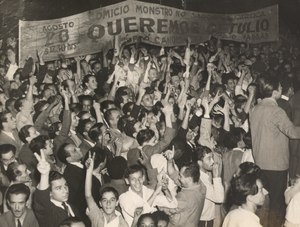1945 Brazilian coup d'état
| 1945 Brazilian coup d'état | |||||||
|---|---|---|---|---|---|---|---|
 Demonstration in favor of Getúlio Vargas at the end of the Estado Novo, August 1945 | |||||||
| |||||||
| Belligerents | |||||||
|
|
| ||||||
| Commanders and leaders | |||||||
| Getúlio Vargas |
Eurico Gaspar Dutra Góis Monteiro | ||||||
The1945 Brazilian coup d'étatwas acoup d'étatinBrazilby theBrazilian Armythat deposed PresidentGetúlio Vargaswhen the military feared that he would seize absolute power so they forced his resignation on 29 October 1945.
The1945 Brazilian general electionwas held on December 2, 1945, where former Minister of WarEurico Gaspar Dutrawas elected president. A new democraticconstitutionwas adopted on September 18, 1946, thus beginning theFourth Brazilian Republic.
Background
[edit]Though abroad the government defended democracy, there was increasing discontent at home whenWorld War IIcame to an end due to the authoritarian policies byGetúlio Vargasand his government.[1]Growing political movements and democratic demonstrations forced Vargas to abolish censorship in 1945, release numerous political prisoners, and allow for the reformation of political parties including theBrazilian Communist Partywhich supported Vargas after direct direction from Moscow.[2][3]University students began to mobilize in 1943 against Vargas. Strikes, which were banned began to re-emerge thanks to war inflation and even Minister of Foreign AffairsOswaldo Aranhawas in favor of a democratic shift.[4]Vargas himself built support after establishing theBrazilian Labour Party(and his aforementioned support from urban workers) and also found help from the left when it applied.[5]
Coup
[edit]Vargas added the Additional Act to the constitution, which, among other things, provided for a 90-day period during which a time and date for elections would be designated. Precisely ninety days afterwards, the new electoral code was issued, established 2 December 1945 for the election of the president and a (new) constituent assembly and state elections on 6 May 1946. Furthermore, Vargas promulgated his intention not to run for president.[6]The military feared that Vargas was about to seize absolute power (after a detrimental move on 25 October 1945, removingJoão Albertofrom chief of police of the Federal District and replacing him with Vargas's brotherBenjamin), so they forced his resignation and deposed him on 29 October, ending his first presidency.[7][8]
References
[edit]- ^Meade 2010,p. 150.
- ^Fausto & Fausto 2014,p. 225.
- ^Meade 2010,pp. 150–151.
- ^Fausto & Fausto 2014,pp. 223–224, 226.
- ^Meade 2010,pp. 136, 151.
- ^Fausto & Fausto 2014,p. 224–225.
- ^Meade 2010,p. 151.
- ^Fausto & Fausto 2014,p. 227.
Bibliography
[edit]- Fausto, Boris;Fausto, Sérgio (2014).A Concise History of Brazil(2º, revised ed.).São Paulo,Brazil:Cambridge University Press.ISBN978-1-10763-524-1.
- Meade, Teresa(2010).A Brief History of Brazil(2º ed.). New York:Facts On File.ISBN978-0-81607-788-5.
